
Intercultural Pragmatics
Scope & Guideline
Pioneering Research at the Intersection of Language and Culture.
Introduction
Aims and Scopes
- Intercultural Communication:
The journal investigates how cultural differences impact communication styles, politeness strategies, and speech acts across various cultures. - Pragmatic Theory and Analysis:
It provides a platform for theoretical advancements in pragmatics, including discussions on speech acts, implicature, and relevance theory. - Multilingual and Multicultural Contexts:
Research often centers on multilingual interactions and the complexities of communication in workplaces and social settings that involve multiple languages. - Identity and Power Dynamics:
The journal explores how communication shapes and reflects identities, particularly in power asymmetries and intercultural settings. - Methodological Innovations:
It promotes innovative methodologies in pragmatics research, including multimodal analysis and cognitive approaches.
Trending and Emerging
- Digital Communication and Pragmatics:
An increasing number of studies focus on the pragmatics of digital communication, including the use of emojis, memes, and online interaction, showcasing how technology shapes language use. - Cultural Identity and Pragmatics:
Research is increasingly exploring the negotiation of cultural identities in communication, particularly in contexts involving diaspora, multilingualism, and globalization. - Multimodal Communication:
There is a growing interest in multimodal analysis, examining how various modes of communication (e.g., visual, gestural) interact with verbal language in intercultural contexts. - Pragmatics and Education:
Emerging themes include the teaching and learning of pragmatics in second language acquisition, reflecting a heightened awareness of the importance of pragmatic competence in language education. - Cognitive Approaches to Pragmatics:
A trend towards integrating cognitive science with pragmatics is evident, with research exploring how cognitive processes influence pragmatic understanding and communication.
Declining or Waning
- Traditional Linguistic Analysis:
There seems to be a decline in research focused solely on traditional linguistic analyses without considering cultural context, reflecting a shift towards more integrated approaches. - Static Models of Communication:
Studies employing static models of communication, which do not account for the dynamic nature of discourse, are becoming less prevalent as the field moves towards understanding interaction as a fluid process. - Focus on Individual Languages:
There is a noticeable reduction in papers that concentrate on the pragmatics of individual languages in isolation, with a growing emphasis on cross-linguistic and intercultural comparisons.
Similar Journals
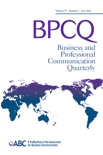
Business and Professional Communication Quarterly
Innovating the Way We Communicate in Professional Settings.Business and Professional Communication Quarterly, published by SAGE Publications Inc., stands as a vital resource in the fields of business communication and professional interaction. With an ISSN of 2329-4906 and an E-ISSN of 2329-4922, this journal serves as a platform for scholars and practitioners to explore the nuances of communication within various business contexts. It holds an impressive Q2 ranking in the Arts and Humanities category and features prominently in several other relevant categories, as evidenced by its competitive Scopus rankings. Covering a broad scope from 2015 to 2024, the journal offers insights into innovative communication strategies, best practices, and emerging trends that resonate with both academic and practical audiences. Although not an open-access journal, the accessibility of its well-researched articles ensures that valuable knowledge is available to those invested in enhancing business communication methodologies. The journal is instrumental for researchers, professionals, and students aiming to advance their understanding of effective communication in the professional landscape, thus contributing to the discourse on best practices in this essential area.
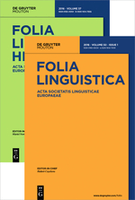
FOLIA LINGUISTICA
Connecting Scholars Through Language DiscoveryFOLIA LINGUISTICA, published by WALTER DE GRUYTER GMBH, is a premier scholarly journal dedicated to the field of linguistics. Established in 1967, the journal has consistently provided a platform for innovative research and scholarly discourse in language and linguistics, contributing significantly to the academic community's understanding of language structures, usage, and cognitive processes. With its classification in the top quartile (Q1) of linguistics and language in 2023, FOLIA LINGUISTICA holds a respectable rank (#282/1088) within the Arts and Humanities category and an admirable percentile rank of 74th, ensuring its position at the forefront of linguistic scholarship. Researchers and academics from around the globe can access a wealth of knowledge and cutting-edge research findings through this esteemed publication, which is vital for anyone looking to engage with the latest advancements in linguistics. Located in Berlin, Germany, FOLIA LINGUISTICA encompasses all aspects of language research, making it an indispensable resource for researchers, professionals, and students alike seeking to deepen their understanding of language and its complexities.
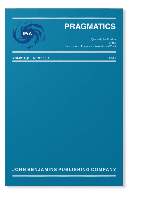
Pragmatics
Advancing interdisciplinary insights in pragmatics.Pragmatics is a premier international journal dedicated to the exploration and development of the field of pragmatics, published by John Benjamins Publishing Co. This esteemed journal, with an ISSN of 1018-2101 and E-ISSN 2406-4238, offers a vital platform for interdisciplinary research in linguistics, philosophy, and social sciences, making significant contributions to scholarly discourse since its convergence in 2005. Recognized for its high-impact research, Pragmatics boasts a prestigious Q1 ranking in both Linguistics and Language and Philosophy as of 2023, with impressive Scopus rankings that place it in the top percentiles of its categories. The journal aims to enhance understanding of communication in diverse contexts and encourages submissions that reflect innovative theoretical perspectives and empirical findings. Although not an open-access journal, it is essential for researchers, professionals, and students seeking to stay at the forefront of pragmatic studies and related disciplines. With its base in Belgium and an address in Amsterdam, Pragmatics continues to influence global conversations in the humanities and social sciences.

Deutsch als Fremdsprache-Zeitschrift zur Theorie und Praxis des Faches Deutsch als Fremdsprache
Transforming Language Learning through Scholarly InsightDeutsch als Fremdsprache-Zeitschrift zur Theorie und Praxis des Faches Deutsch als Fremdsprache is a prominent academic journal published by ERICH SCHMIDT VERLAG in Germany, focused on advancing the field of German as a foreign language. With an ISSN of 0011-9741 and E-ISSN of 2198-2430, this journal has carved out a significant niche in linguistics and language education, reflecting its robust academic rigor as indicated by its ranking in the Q2 in Linguistics and Language and Q3 in Education quartiles for 2023. It occupies an important role in disseminating research, practical methodologies, and theoretical insights that contribute to the improvement of German language instruction globally. While it is not an open-access journal, its influence is bolstered by comprehensive reviews and scholarly contributions that are essential for researchers, educators, and students alike. With a history of converged years from 2013 to 2024, this journal remains a vital resource for those interested in the theoretical and practical aspects of teaching and learning German.
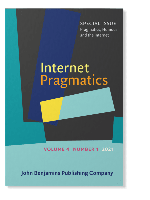
Internet Pragmatics
Bridging Linguistics and Digital NetworksInternet Pragmatics, published by John Benjamins Publishing Company, stands as an essential journal within the fields of Computer Networks and Communications and Linguistics and Language. With an ISSN of 2542-3851 and an E-ISSN of 2542-386X, it has been dedicated to exploring the nuanced interactions and societal implications enabled by the internet since its inception in 2019. The journal has quickly gained a strong academic reputation, achieving a Q3 ranking in its Computer Networks and Communications category and a prestigious Q1 ranking in Linguistics and Language for 2023, showcasing its vital contribution to interdisciplinary discourse. Researchers and professionals alike can benefit from its robust collection of articles that delve into the intersection of technology and communication, making it a pivotal resource for those keen on understanding the evolving landscape of digital interaction. Although currently available through traditional access options, the journal endeavors to broaden access, ensuring that valuable insights in this rapidly advancing field reach a wider audience.

Russian Journal of Linguistics
Discovering the Nuances of Language TogetherWelcome to the Russian Journal of Linguistics, a prestigious journal published by Peoples Friendship University of Russia that has made significant strides in the realm of linguistic studies since its inception. With an Open Access policy established in 2019, this journal provides unparalleled opportunities for researchers, professionals, and students to share and disseminate groundbreaking linguistic research. The journal is currently ranked in the Q1 category for Linguistics and Language and boasts impressive Scopus rankings, placing 129th out of 1088 in the Arts and Humanities, and 148th out of 1167 in the Social Sciences. Focusing on a diverse range of linguistics topics, the journal aims to facilitate cross-disciplinary dialogue and foster advancements in the study of language. Located in Moscow, Russia, it champions the vibrant linguistic community by consistently publishing high-quality research that contributes to the global understanding of language dynamics. We invite you to explore the wealth of knowledge and insight the Russian Journal of Linguistics has to offer.
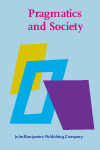
Pragmatics and Society
Bridging Pragmatics and Social TheoryPragmatics and Society, published by John Benjamins Publishing Co, is an esteemed journal that serves as a vital platform for the interdisciplinary exploration of language use in social contexts. Established with the aim of bridging the gap between pragmatics and social theory, this journal covers innovative research and critical methodologies within linguistics and language studies. With an impressive impact factor and recognition as a Q2 journal in the field of Linguistics and Language for 2023, it ranks notably within the 75th percentile for Arts and Humanities and 73rd for Social Sciences. Based in the Netherlands, Pragmatics and Society is dedicated to fostering scholarly discussions and advancing knowledge in areas such as discourse analysis, sociolinguistics, and communicative practices. Researchers, professionals, and students alike will find this journal to be an invaluable resource for understanding the complexities of language in society and are encouraged to engage with its rigorous publications.
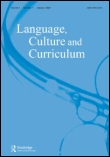
Language Culture and Curriculum
Fostering Scholarly Dialogue in Language and EducationLanguage Culture and Curriculum is a premier academic journal published by Routledge Journals, Taylor & Francis Ltd, dedicated to advancing knowledge in the fields of Education and Linguistics. With a distinguished history since 1988 and converging through to 2024, this journal is highly regarded, reflecting its exemplary standing with a 2023 Q1 ranking in both Education and Linguistics. Currently among the top 3% of publications in Language and Linguistics and ranked 27th in Social Sciences, Language Culture and Curriculum fosters the exploration of language education within diverse cultural contexts. Through rigorous peer-reviewed research, it serves as an essential platform for researchers, educators, and policymakers alike, promoting innovative practices and theoretical frameworks in language teaching and curriculum development. Although it does not offer Open Access, the journal remains an invaluable resource in academic circles, supporting scholarly discourse and advancing educational methodologies.
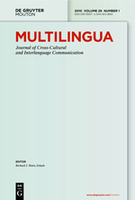
Multilingua-Journal of Cross-Cultural and Interlanguage Communication
Pioneering Research in Language and Cultural ExchangeMultilingua: Journal of Cross-Cultural and Interlanguage Communication is a premier academic journal published by DE GRUYTER MOUTON, specializing in the dynamic fields of communication and linguistics. Established in 1982, this journal has significantly contributed to the discourse surrounding multilingualism, intercultural interactions, and language acquisition, with a notable reputation backed by an impressive Q1 ranking in both Communication and Linguistics and Language for 2023. Positioned strategically at the heart of Germany, the journal serves as a vital platform for researchers, professionals, and students alike, fostering scholarly exchange and insights into cross-cultural communication practices. With rankings placing it in the top percentiles across key categories in Scopus, including Arts and Humanities and Social Sciences, Multilingua exemplifies the highest standards of academic excellence. Although currently not an Open Access journal, it continues to provide a wealth of knowledge to the global research community.
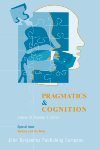
Pragmatics & Cognition
Fostering Insightful Dialogues on Language and ThoughtPragmatics & Cognition, published by John Benjamins Publishing Co, is an esteemed journal that serves as a cross-disciplinary platform for the study of language, cognition, and context-dependent communication. With its ISSN 0929-0907 and E-ISSN 1569-9943, the journal has established a notable reputation since its inception in 1993, although its coverage spans various fields from behavioral neuroscience to linguistics and philosophy. Recognized for its scholarly contributions, it holds impressive Scopus rankings, significantly within Linguistics and Language, where it ranks in the 63rd percentile among peers. Although it currently maintains a Q4 designation in Behavioral Neuroscience and a Q1 in Linguistics and Language as of 2023, the journal appeals to a diverse audience addressing the intricate relationships between language use and cognitive processes. As researchers and academics navigate this evolving landscape, Pragmatics & Cognition remains pivotal in fostering essential dialogues and advancing knowledge in the interdisciplinary field, providing rich content that is both insightful and relevant.